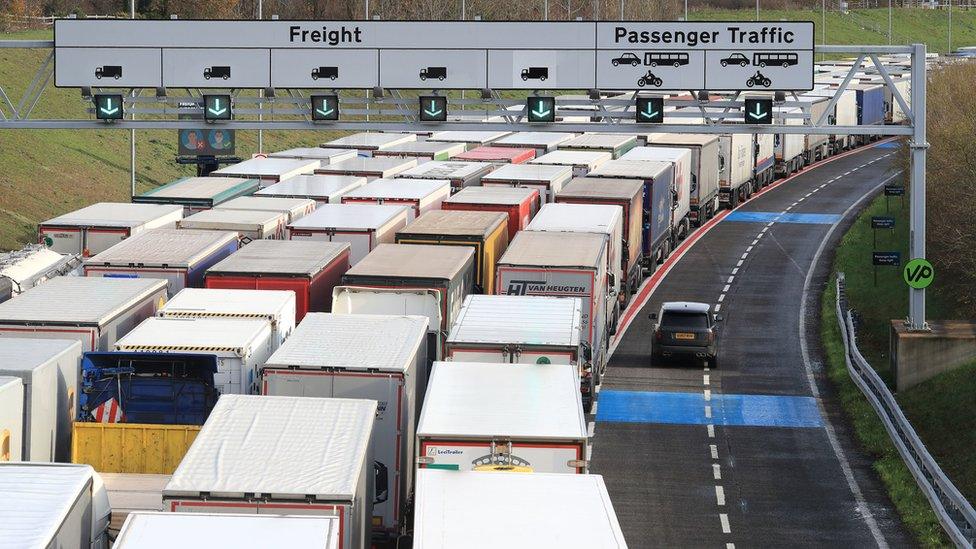Brexit trade: 'Serious disruption' risk at Channel post-transition period
- Published
- comments

A group of MPs have warned of the "risk of serious disruption and delay" at Channel crossings when the Brexit transition period ends on 31 December.
The Commons Public Accounts Committee said the government was "taking limited responsibility" for national readiness ahead of the looming deadline.
And it said the necessary systems would not be in place in time, regardless of whether an EU trade deal is agreed.
A government spokeswoman said they were "making significant preparations".
They added it was "vital that businesses and citizens make their final preparations too", and they were "intensifying our engagement... so they know exactly what they need to do to get ready."
But the committee's chair, Labour's Meg Hillier, said the prime minister's promise of an "oven ready" Brexit deal at the last election had become more of a "cold turkey".
The UK left the EU on 31 January, but has been following the bloc's rules as part of a transition period while the two sides negotiate a trade deal.
Talks began in March and are continuing in London this week, but sticking points on fishing and competition rules remain, despite the impending deadline of the end of 2020.
If a deal is not agreed and ratified by parliaments by the end of the year, the UK will trade with the EU on World Trade Organisation rules - which critics fear will damage the economy.
But Boris Johnson believes the UK will "prosper" with or without an EU trade deal.
The committee has published 12 reports warning about the need for Brexit readiness since the referendum in 2016.
It said it had been assured the necessary systems were "on track or that delays were being managed", but added: "And yet, with a few weeks to go, border systems remain in development and plans for managing disruption or prioritisation of key goods are unclear."
'Significant risks'
In its latest publication, the cross-party group of MPs said it remained "extremely concerned" - especially for Channel crossings, which were the delivery point for the majority of the UK's fresh food supplies.
The committee added: "There are still significant risks to the country being ready for the end of the transition period on 31 December 2020, but government still only seems to be taking limited responsibility for that readiness.
"Industry bodies have said that government has not provided key information needed by businesses to prepare, such as detailed guidance on how to apply for simplified customs procedures."

The basics
Brexit happened but rules didn't change at once: The UK left the European Union on 31 January 2020, but leaders needed time to negotiate a deal for life afterwards - they got 11 months.
Talks are happening: The UK and the EU have until 31 December 2020 to agree a trade deal as well as other things, such as fishing rights.
If there is no deal: Border checks and taxes will be introduced for goods travelling between the UK and the EU. But deal or no deal, we will still see changes.

But in response to the report, the government insisted IT systems were "on track and will be ready" and its "wider plans for managing disruption and the prioritisation of key goods are well established".
A spokeswoman added: "Industry has been engaged in the plans from the outset."
Confused by Brexit jargon? Reality Check unpacks the basics.
The report from the committee also said:
The impact of the "Get ready for Brexit" campaign in 2019, which cost £46m before being scrapped, was "unclear" and the government was "still not doing enough to ensure businesses and citizens are ready"
A survey used in the report found 36% of small and medium sized firms expected the transition period to be extended
The Cabinet Office admitted it had no knowledge of how many of the remaining 64% will be ready for the change
A total of £4.4bn had been spent on preparing for Brexit, involving 22,000 civil servants and "many more" paid consultants, with "too much" being spent on the latter
Ministers specifically limited the amount of contingency planning the civil service could carry out for a Brexit scenario ahead of the referendum
Brexit preparations and the Covid-19 response exposed "critical gaps in the civil service's approach to planning, particularly for unexpected events or undesired outcomes"
Ms Hiller, added: "Pretending that things you don't want to happen are not going to happen is not a recipe for government, it's a recipe for disaster.
"We're paying for that approach in the UK's response to the Covid-19 pandemic and can only hope that we're not now facing another catastrophe at the border in four weeks' time.
"A year after the oven-ready deal, we have more of a cold turkey and businesses and consumers do not know what to be prepared for."
'Dig deep'
The report called for the Cabinet Office to conduct a formal review of the whole period of preparations.
It added: "Government must maximise all remaining opportunities for getting businesses and individuals to act in the time remaining to January 2021."
A government spokesman said: "We've been clear from the outset that we all have a responsibility to get ready.
"And with just one month to go it's vital we all dig deep and do what needs to be done before the end of the year."